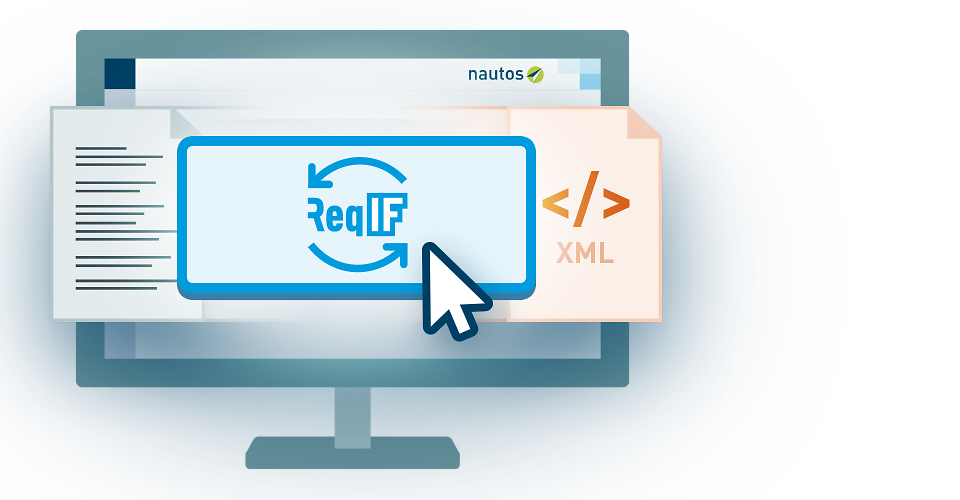Your benefits at a glance
|
|
|

|

|
|
Fast and easy Import standards documents into software systems that enable ReqIF import. |
SMART enrichment Utilization of standards documents and granular requirement objects within RMSs. |
Efficiency Automated, rule-based enrichment of requirement objects for identification and classification. |
Precision Filtering and sorting of requirement objects based on bibliographic and object-related metadata. |
Nautos module ReqIF converter briefly explained in the video:
Try the Nautos ReqIF converter
You are invited to try ReqIF data from the new Nautos module for an unlimited period of time. A comprehensive download set with sample data and technical descriptions is available for this purpose.
You have the option of testing the ReqIF format using DIN Media Standard or with optimizations for various target systems:
- IBM Doors Classic (RMS)
- PTC Windchill (PLM / RMS)
- Siemens Polarion (RMS)
- Generic ReqIF-XML (DIN Media Standard)
The package (ZIP file) contains 5 DIN Spec in 3 target system versions each + generic variant (= 20 ReqIF documents) as well as a quick guide of the attributes used and their assignment as an Excel sheet.
DIN Spec standards included in the test package:
- DIN SPEC 13257:2019-09: Single-use foot bandage in medical foot treatment - Requirements and test methods
- DIN SPEC 13259:2020-09: Reusable venous tourniquets for hygienic blood sampling - Requirements
- DIN SPEC 91369:2018-04: Cleanliness of the track superstructure as part of track maintenance
- DIN SPEC 91414-1:2021-04: Portable vehicle security barriers - Part 1: Requirements, test methods and performance rating
- DIN SPEC 91422:2020-06: Requirements for planning and safety in the multifunctional high-tech working environment surgical theatre

New and unique!
Convert XML-based documents to ReqIF.
The Nautos ReqIF converter module is a service within the Nautos platform that allows you to convert standards documents into the Requirement Interchange Format (ReqIF). This XML-based format facilitates the exchange of requirements between different systems.
The ReqIF converter module was developed exclusively for all Nautos customers, both existing and new, who need standards documents in requirements management systems or want to use requirements granularly.
The Nautos ReqIF converter is currently unrivalled and unique, which means you probably have questions about our new Nautos module. We can certainly answer some of them with the following FAQ.
FAQs about Nautos module ReqIF converter
-
- Simple and fast import of standards documents into software systems that enable ReqIF import — including full text, figures, tables, formulae and metadata.
- The use of standards documents and granular requirements objects within requirements management systems and projects implemented there.
- Automated, rule-based enrichment of requirement objects for faster identification and classification.
- Filtering and sorting of requirement objects based on bibliographic and object-related metadata.
-
The converter enables the automated retrieval of standards documents as ReqIF versions with suitable metadata from our standards management solution Nautos (to download). This facilitates the integration of the content of standards into requirements management systems.
-
Standards documents from the DIN, DIN EN and DIN EN ISO regulations can currently be converted, provided they are already available in XML structure in Nautos. In the case of newly published standards, there may be a time lag between publication of the PDF and provision of the XML-structured standard.
One prerequisite is that the full-text document you have purchased is available as an XML document in Nautos and that you have the right to reproduce it using a network licence for the DIN collection. For more details see Network licences for standards.
-
Nautos provides the ReqIF format in a generic variant that enables high compatibility with most target systems. In addition, the output format can be configured via the Nautos interface to ensure optimized compatibility with the following systems.
• IBM Doors Classic
• PTC Windchill RV&S
• Siemens Polarion -
The prerequisite for using the ReqIF converter is the purchase of the Nautos standards management and the appropriate licence for the module, depending on the number of employees in the company. There are different price categories — we would be happy to provide consultations on this.
-
Yes, there is a comprehensive download set with sample data and technical descriptions available for potential customers to try before purchasing the module. This set makes it possible to try the ReqIF format in various target systems. Can be found on this page, above the FAQ.
-
Implementation is not required. As soon as the module is activated in the standards management Nautos, the function is available for the Admin role. Help texts and explanatory videos on using the ReqIF converter are provided in the Nautos Help section.
-
Videos and help texts to support you are available in the Nautos Help section. For specific questions, the Sales Standards Management team can be contacted by email at normenmanagement@beuth.de or by telephone on +49 30 58885700-50.
-
Yes, the Nautos ReqIF Converter module enables the conversion of multiple documents. You can select individual or multiple documents in the search result and start the conversion.
-
Updates and new features of the module are announced in the free Standards Management Dialogue webinar and published in the respective Nautos release notes. The release notes contain detailed information on new functions, improvements and fixed bugs.
-
In the case of newly published standards, there may be a delay between publication of the PDF and provision of the XML-structured standard. As a rule, the standard is made available no later than 6 weeks after publication.
-
Users are responsible for validating the conversion results, particularly with regard to their use within their own systems and processes. This includes checking the classification and presentation of content.
-
The ReqIF converter module provides an automatic pre-classification for the modalities of the requirement objects, which can only analyse text-based content and determine the level of obligation based on the modal auxiliary verbs. If the sentence structure in natural language is too complex or ambiguous, sentence recognition or pre-classification might not be correct. The user must then rework this. Graphics and unspecific design features cannot be analysed.
For these reasons, users are responsible for validating the conversion result with regard to its use in their own systems and processes. -
Conversion is currently carried out according to a standardized procedure. For specific requirements, however, the support team can advise on a case by case basis in order to find solutions.
-
ReqIF is an XML format intended exclusively for use in requirements management systems (and similar software systems that offer ReqIF import). Please contact us if you are interested in obtaining generic XML data.

